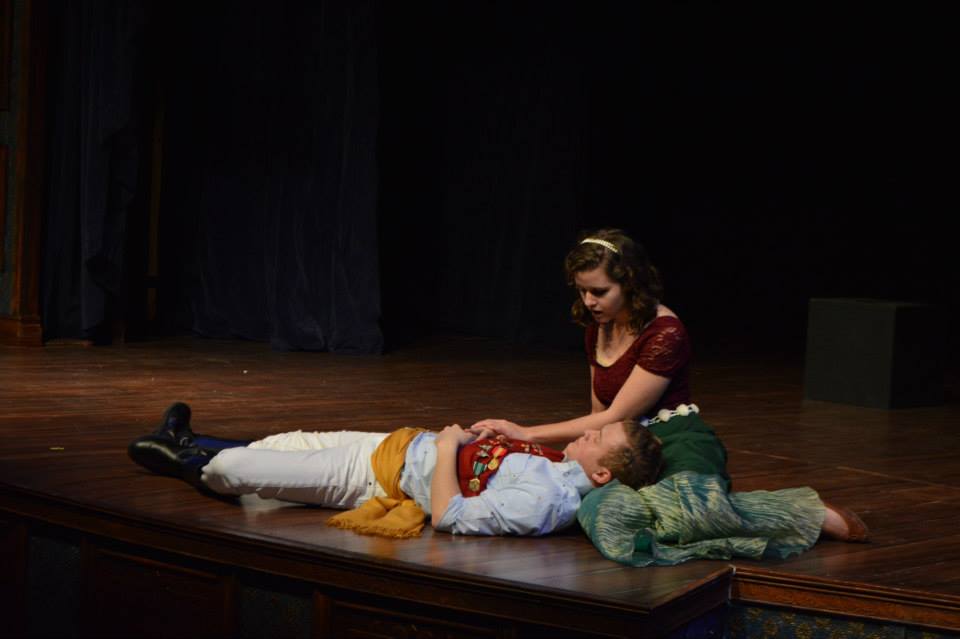OREM — Even before the show started, I knew The Little Mermaid was going to be good. The cast was onstage, singing “Auld Lang Syne” with the warm-up act. Their joy was palpable, and unlike so many actors, this was clearly a tight, egoless group that could put on a show.

This take on Hans Christian Andersen’s The Little Mermaid was in Shakespearean-style language—more forsooths, fewer singing flounders. The adapter, Christopher Clark, created the script by taking phrases, lines, and scenes from Shakespeare‘s plays to tell the story of Marina, the mermaid princess who falls in love with a human. Throughout the script Clark showed a deft hand at both the subject and the style.
The play is billed as a Shakespearean tragedy. Combined with the eerie underwater cast photos on the website, I fully expected something serious. Nothing could be further from the truth. The first three-fourths of the play hummed along, brimming with warmth and joviality, thanks to the smart script and eager, talented cast.

As the title character, Christie Clark Rasmussen made me fall in love with her with guileless innocence and charm. She showed an advanced capability of interpreting lines, and perfectly embodied her lovesick mid-teen character. Simply put, Rasmussen can deliver.
Eric D. Geels gave an especially strong delivery as the Sea King, with sharp performance and elocution, giving his character the appropriate, authoritative demeanor. Nick Gledhill also gave a good performance as Prince Edward, whose boyish charms seemed a likely suspect for the Marina’s affections.
 In this interpretation of the original fairy tale, the mermaid sisters had refreshingly distinct personalities. I love that there was an emo mermaid (Rachel Heath), for example. The male-in-a-coconut-bra mermaid princess was Addison Radle, who acted a good fool through several roles. I like how he talked to the ceiling instead of anyone in particular. Such variations among characters made the play accessible, despite the dated language. The entire play was scored by a live 5-piece band (uncredited). The electric guitar, gong, and tambourine gave a surf-lite vibe that was appropriate for the style of the show.
In this interpretation of the original fairy tale, the mermaid sisters had refreshingly distinct personalities. I love that there was an emo mermaid (Rachel Heath), for example. The male-in-a-coconut-bra mermaid princess was Addison Radle, who acted a good fool through several roles. I like how he talked to the ceiling instead of anyone in particular. Such variations among characters made the play accessible, despite the dated language. The entire play was scored by a live 5-piece band (uncredited). The electric guitar, gong, and tambourine gave a surf-lite vibe that was appropriate for the style of the show.

During the show, I asked myself if this Elizabethan-mermaid mashup has reason to exist. I believe so. Disney’s version has so thoroughly permeated culture (and rightfully so . . . darn masterpiece) that perhaps the best way to return to the material is doing something completely different. Clark did a bang-up job incorporating the Bard’s prose to create a piece that pays homage to Shakespeare without becoming cliché. Of course, there is only one Bard; putting his name in the subtitle is a lot to live up to. The old-style speech was most effective in dramatic turns, like when the grandmother (Jyllian Petrie) explains that souls never die.

Yet, the night did have a few small flaws. I could not hear most of the dialogue above the music during the shipwreck, and Heath was too quiet at times, even though I was sitting on the third row. In the costume department, Geels needs to make himself some thicker knickers. Also, the cast had several noticeable instances of tripping over the language and misspeaking words.
The script, which I adored as a whole, felt like a soap opera after the mermaid went ashore. And the ending was partly unsatisfying because its clarity and impact was perhaps lessened by lack of stage design. Finally, I was displeased with the bloodthirsty audience, who demanded vengeance on an innocent—if thoughtless—character.
But overall, with its strong script and cast, this unique version of The Little Mermaid was a delight. This was my first time enjoying a performance by the Grassroots Shakespeare Company, and it was the freshest thing I have seen on stage in Utah in a long time. This fresh presentation of well-loved material deserves to be produced many more times. I recommend seeing it and anything else the Grassroots Shakespeare Company does in the future.
[box type=”shadow”]Remaining performances of the Grassroots Shakespeare Company production of The Little Mermaid play January 2 and 3 at the Noorda Theater on the campus of Utah Valley University, and January 5, 8, 9 and 10 at the Ladies Literary Club (850 E. South Temple, Salt Lake City). Tickets are $8-15. For more information, visit www.grassrootsshakespeare.com.[/box]
